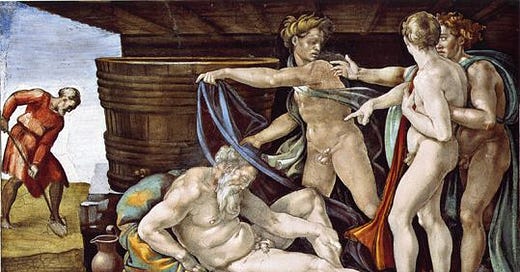Ancient Wisdom
I thought the below tweets from Alexey Guzey were pretty interesting
This instinct to prepare for everything life might throw at you gets at the value of tradition and ritual. Jews studying the Talmud literally spend every day learning and debating ancient wisdom on how to mourn the death of a family member, adjudicate a property dispute with a neighbor, what kinds of food to eat, and so on. Though I don’t think Alexey had the study of the Talmud in mind, it does seem to fulfill all the different criteria in his last tweet pretty well.
Patrick Collison comes at this question from a slightly different angle on the “Questions” tab of his website. He asks
Why is there no canon for life's most important questions?
If we go to study economics, we quickly become familiar with The Wealth of Nations and Keyne's General Theory. If we become interested in moral philosophy, we swiftly encounter Reasons and Persons and A Theory of Justice. But for many of life's most important questions, we won't find any similar canon. That is, there are no similarly definitive books about how to navigate your education, how to select a career, how to choose a partner, how to be a good friend, or how to raise your children well. That's not to say that there aren't lots of books on these questions. There are, of course. But there are none that are so good, or important, that you might assume that others interested in the questions will be familiar with their ideas. Is it not possible for there to be "great" books about these questions? Or have they just not been written yet?
My tentative answer is to check out the Talmud/similar texts, but maybe what his question is getting at is the failure of secularism to replace the life-guides that religion provided. Beyond self-help books, I’m not sure there really are secular works attempting to lay out the practices to live one’s life by.
I’m also in the middle of reading the Xunzi (in part out of an interest in how other traditions treat the relationship between ritual and the good life), so I will probably have more to say on the topic in future posts.
Anthropology
My Goodreads review of “Against the Grain” by James C Scott:
There’s an interesting question of whether there’s any point in lay people reading ATG. After all, there’s no way for me to evaluate the anthropological claims being made, and Scott admits to be offering a contrarian take. If I can’t evaluate the evidence for myself and have to take someone else’s perspective at face value, why go with the hotter take instead of being a good sheep and going along with what my high school history teacher taught?
I think that outlook misses the real point of the book. Other than as an academic question, the truth of what happened thousands of years ago kind of doesn’t matter. The bigger question that the empirical ones touch on is how we should conceive of ourselves and our civilization - a humanistic question. And in that spirit, I think ATG can be fruitfully read as a literary work that asks us to imagine a different way of seeing the world and our own lives. IF nomadic peoples indeed led better lives than early city-dwellers, why might that have been? What might we have lost in creating permanent settlements? How could our lives be different - better? - than they are? Who are the barbarians today and what might they see that we don’t?
Literature is an opportunity to imagine a different world and reflect on our own through the contrast. Read from this perspective, I think ATG is a success and well worth reading.
Alcohol
“Against the Grain” got me thinking about (1) things I learned in history class that might not be true and (2) well, grains. In that spirit, I was rereading this Vox article from a couple of years ago titled “Prohibition worked better than you think”. I remember being struck reading Ulysses S Grant’s biography about how widespread alcoholism was in the 19th century and how much more sympathy I felt for the temperance movement than when I’d first learned about it in school. The Vox article throws out some numbers that make it seem like alcohol was indeed quite socially bad and that the costs of Prohibition might not have been as high as we thought.
Growing up in the ‘00s, it was cool to look down on historical figures for their puritanism. It will be interesting to see if the cultural changes over the last decade or so lead to a broader reevaluation of Prohibition. Apparently Gen Z is drinking less than previous generations regardless though, so behavioral changes may kill booze before the G-men ever show up.





